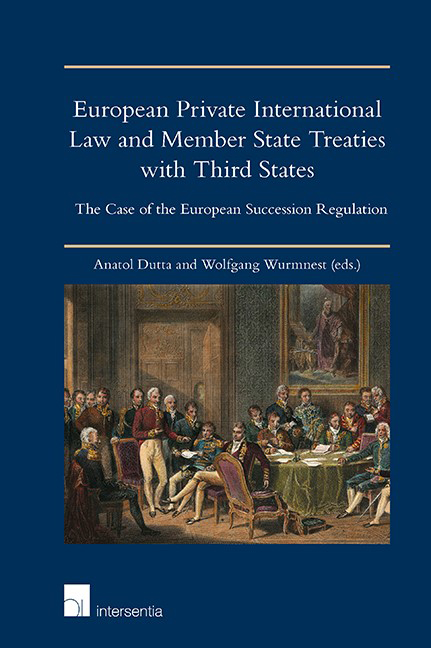 European Private International Law and Member State Treaties with Third States
European Private International Law and Member State Treaties with Third States Book contents
- Frontmatter
- Foreword
- Contents
- List of Treaties and Conventions
- List of Abbreviations
- List of Contributors
- Introduction
- Questionnaire
- PART I THE PERSPECTIVE OF EU MEMBER STATES
- PART II THE PERSPECTIVE OF THIRD STATES
- Bosnia and Herzegovina, Serbia, North Macedonia and Montenegro
- Iran
- Switzerland
- Turkey
- PART III THE PERSPECTIVE OF THE EUROPEAN UNION AND A COMPARATIVE OUTLOOK
- Annex
- Index
- About the Editors
Iran
from PART II - THE PERSPECTIVE OF THIRD STATES
Published online by Cambridge University Press: 12 November 2019
- Frontmatter
- Foreword
- Contents
- List of Treaties and Conventions
- List of Abbreviations
- List of Contributors
- Introduction
- Questionnaire
- PART I THE PERSPECTIVE OF EU MEMBER STATES
- PART II THE PERSPECTIVE OF THIRD STATES
- Bosnia and Herzegovina, Serbia, North Macedonia and Montenegro
- Iran
- Switzerland
- Turkey
- PART III THE PERSPECTIVE OF THE EUROPEAN UNION AND A COMPARATIVE OUTLOOK
- Annex
- Index
- About the Editors
Summary
INTRODUCTION
This contribution intends to evaluate the impact of bilateral treaties concluded between certain European countries and Iran from the perspective of Iranian law. In the late 1920s and early 1930s, Iran concluded a series of such treaties with different countries, including Poland, Germany, Belgium and Luxembourg, Greece, France, Switzerland, Austria and Czechoslovakia. Some of these treaties were concluded on a provisional basis and were not extended after their initial period of validity; some of them have been extended and renewed and are still in force today.
The question of whether and how these treaties are dealt with in Iranian legal writing and interpreted by Iranian courts is difficult to answer for mainly three reasons. The first is that Iranian legal writing does not discuss the treaties in any depth. Where reference is made to any of these treaties, they figure as abstract examples of treaties concluded by Iran that take priority over the domestic conflict-of-laws rules, without any detailed analyzes of their structure, purpose or interpretation. This relates also to a second blank spot, which is the lack of case law on the application of the treaties. In fact, until very recently court decisions were not published at all by any official State-run institution. For a long time case law could only be retrieved from two sources: the compilation of the legal opinions of the plenary session of the Iranian Supreme Court, published by the court itself (since 1995), and private compilations of cases collected by lawyers, law professors or researchers. Both sources, however, are selective, and none of the reported cases relates to the application of the treaties. In an endeavour to bring about more transparency, in 2011 the Law on the five-year development scheme of the Islamic Republic of Iran incorporated a regulation according to which the judiciary became obliged to publish important court decisions. Although some compilations have been published, here again no mention is made of the application or the interpretation of these treaties.
This brings us to the last point, which is a factual one: the lack of academic interest in the treaties as well as of case law may be accounted for by the very few numbers of European nationals having an Iranian domicile or habitual residence. In fact, their number can be assessed only vaguely. The Statistical Centre of Iran that conducts censuses on a five-year basis publishes its findings regularly online.
- Type
- Chapter
- Information
- European Private International Law and Member State Treaties with Third StatesThe Case of the European Succession Regulation, pp. 253 - 266Publisher: IntersentiaPrint publication year: 2019
- 1
- Cited by


